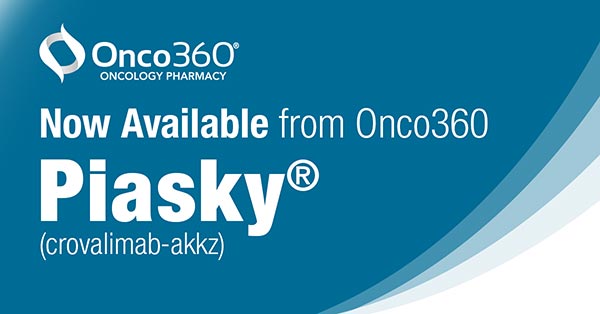
PIASKY® (crovalimab)
July 22, 2024
FOR IMMEDIATE RELEASE:
Onco360® Has Been Selected as a National Specialty Pharmacy Partner for crovalimab-akkz
Louisville, KY — July 22, 2024 — Onco360®, the nation’s leading independent Specialty Pharmacy, has been selected by Genentech, a member of the Roche Group, to be in the pharmacy network for PIASKY® (crovalimab), approved for the treatment of adults and pediatric patients 13 years of age and older weighing at least 40kg, that have paroxysmal nocturnal hemoglobinuria (PNH)1. This indication was approved based on the Phase III COMMODORE-2 (NCT04434092) trial, which compared crovalimab to eculizumab in patients with PNH who had not been previously treated with complement inhibitor therapy.2 Only healthcare providers should administer crovalimab.
“Onco360 is grateful for the opportunity to become a specialty pharmacy provider for crovalimab”, said Benito Fernandez, Chief Commercial Officer. “We are proud to add another treatment option for PNH patients to our portfolio.”
Patients with PNH have an acquired mutation that makes red blood cells susceptible to premature destruction by the complement system. PNH is characterized by bone marrow failure, hemolysis, and thrombosis in varying levels of severity and combinations.3
The FDA approval of crovalimab is based on the results of the Phase III COMMODORE-2 clinical trial, which evaluated the non-inferiority of the complement C5 inhibitor, crovalimab, against eculizumab in PNH patients naïve to treatment with C5 inhibitors. The study randomized 204 patients 2:1 to receive either crovalimab (n=135) or eculizumab (n=69). The coprimary endpoints were the proportion of patients who achieved transfusion avoidance and the proportion of patients with hemolysis control (measured by lactate dehydrogenase of ≤ 1.5 x upper limit of normal), from baseline through week 25. The results showed treatment with crovalimab met both coprimary endpoints demonstrating noninferiority to eculizumab for transfusion avoidance (65.7% vs 68.1%, respectively; treatment difference, -2.8% [95% CI, -15.7, 11.1]) and hemolysis control (79.3% vs 79.0%, respectively; odds ratio, 1.02 [95% CI, 0.57-1.82]).
The safety data for crovalimab is supported by the COMMODORE-2 trial and the COMMODORE 1 trial, which randomized treatment for experienced patients to switch to crovalimab (n=44) or continue eculizumab (n=42). Across these trials, the most common adverse drug reactions, occurring in 10% or more of patients, were infusion related reactions such as respiratory tract infection, viral infection, and Type III hypersensitivity reactions.
The prescribing information for crovalimab includes a Boxed Warning regarding the risk of serious and life-threatening infections caused by Neisseria meningitidis. Because of this risk, crovalimab, as part of a class of therapies that treats PNH, is available only through a restricted program called the PIASKY Risk Evaluation and Mitigation Strategy (REMS). More information about the PIASKY REMS Program is available at PiaskyREMS.com.
Vaccinate against meningococcal infection at least two weeks prior to initiation of crovalimab or provide antibacterial drug prophylaxis if urgent crovalimab therapy is indicated for a patient who is not up-to-date with meningococcal vaccines and vaccinate as soon as possible. The initiation of crovalimab treatment is contraindicated in patients with unresolved Neisseria meningitidis infection.
Please see the full Prescribing Information for crovalimab. PIASKY® (crovalimab) is a registered trademark of Chugai Pharmaceutical Co., a member of the Roche Group.
Media Contact: Benito Fernandez, Chief Commercial Officer
516-640-1332
References:
- crovalimab Prescribing Information. Accessed July 2024.
https://www.gene.com/download/pdf/piasky_prescribing.pdf - Kulasekararaj,A et al. COMMODORE 1: scheinberg P, Clé DV, Kim JS, et al. Phase 3 randomized COMMODORE 1 trial: Crovalimab versus eculizumab in patients with paroxysmal nocturnal hemoglobinuria naïve to complement inhibition. AM J Hematon. 2024; 1-10. Doi: 10.1002/ajh.27412.
- Cançado RD, Araújo A da S, Sandes AF, et al. Consensus statement for diagnosis and treatment of paroxysmal nocturnal haemoglobinuria. Hematol Transfus Cell Ther. 2021;43(3):341-348. doi:10.1016/j.htct.2020.06.006
